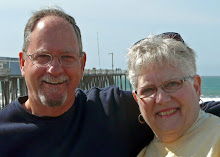After lunch we visited two ancient Indian ruins. One was built into the rock outcrop below a cliff overhang. It was only about three miles from the campground. The other was at Edge of the Cedars State Park and Museum. The ruin was just sitting behind the museum at ground level adjacent to a residential sub-division. We explored the ruins, and Mike went down into a Kiva (this is where religious ceremonies were held) after we toured the amazing museum. It is a world class research facility with an archaeological repository for all of Southeast Utah. Their collection of Ancestral Puebloan pottery is surprising both in the amount of items and their condition. The storage area is visible to museum visitors and you can get information on any object by accessing a computer right by the display. Their most prized possession is a Macaw Feather Sash. They have many pottery pieces, mainly bowls; woven items like baskets, sandals, arrow heads, baby carriers, etc.

The next day we took The Moki Dugway/Valley of the Gods Road Trip. The first stop we made was so Mike could hike in to see another Indian ruin.
We then drove to Natural Bridges National Monument where we saw three of the world’s largest natural stone bridges off an 8-mile loop through the park. We learned from a ranger that moving water sculpts bridges and frost action and seeping moisture sculpt arches. Wind surely has some effect on them also. The bridges here are larger than the arches in Arches according to the ranger.
Our next stop was Muley Point, getting there on a four mile dirt road. It offered us a great view from the canyon’s edge, looking at Valley of the Gods, Monument Valley and John’s Canyon. A spectacular view and worth the drive.
Then on to the Moki Dugway! A ‘dugway’ is a road or trail along a hillside which is dug out to provide a path for transport. This was built in the 1950’s during the uranium boom. It is an 11% grade on gravel and the views from the road and the overlook at the top were worth the trip, although it did get a little hairy at times. Good thing we just had the truck.
Onward…..our next stop was Goosenecks State Park where we enjoyed our picnic lunch with some Italian tourists. We came across our first Indian peddler of jewelry. Having lunch here was nice because a shelter over a large picnic table was provided. The Goosenecks sits on a high mesa and has one viewpoint of several huge river bends flowing in a deep canyon with a series of stepped cliffs and terraces. It is a feature recognized as one of the best examples of entrenched river meanders in the world. The San Juan River flows through 5 miles of canyon while progressing westward only one mile. Looking down on it was a spectacular view. The canyon is 1,500’ deep and geologic layers are easily seen. Gorgeous! Mike remembers seeing pictures of the Goosenecks while he was in college, so this was a real treat to see it in person. We also saw some beautiful rock outcrops in the distance, in reds and beiges that formed wave-like shapes, or chevrons!
Our next move was to Hanksville, a tiny bump in the road town which served as our base for visiting Goblin Valley State Park. We saw some absolutely beautiful scenery on the way here.
After a yummy omelet we headed to Goblin Valley State Park. Just at the entrance to the park Mike spotted 5 pronghorn antelopes frolicking in the sun. We watched them for quite a while.
Goblin valley, which is only about a mile across and two miles long contains thousands of mushroom-shaped pinnacles or hoodoos a few feet high that someone obviously thought resembled goblins. The formations have large orange-brown boulders of hard rock atop weaker sandy layers which have eroded more quickly, as a result of millions of years of the combined effects of wind and rain. We walked among the stone gnomes inhabiting the valley and were very lucky that most of the time it was overcast.
On our way ‘home’ we stopped to see some petroglyphs. There weren’t many, but they were very clear and a hike wasn’t necessary!





































No comments:
Post a Comment